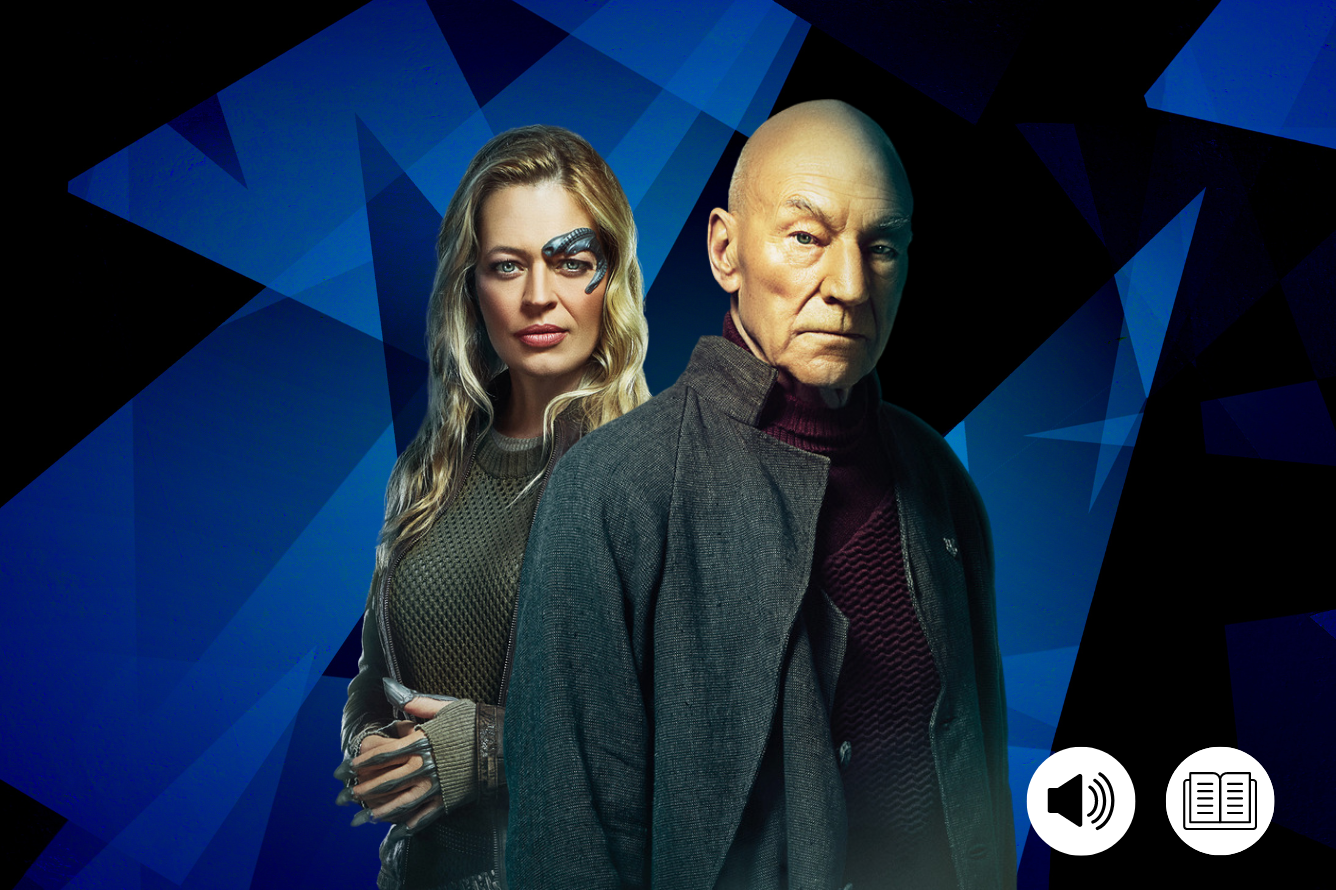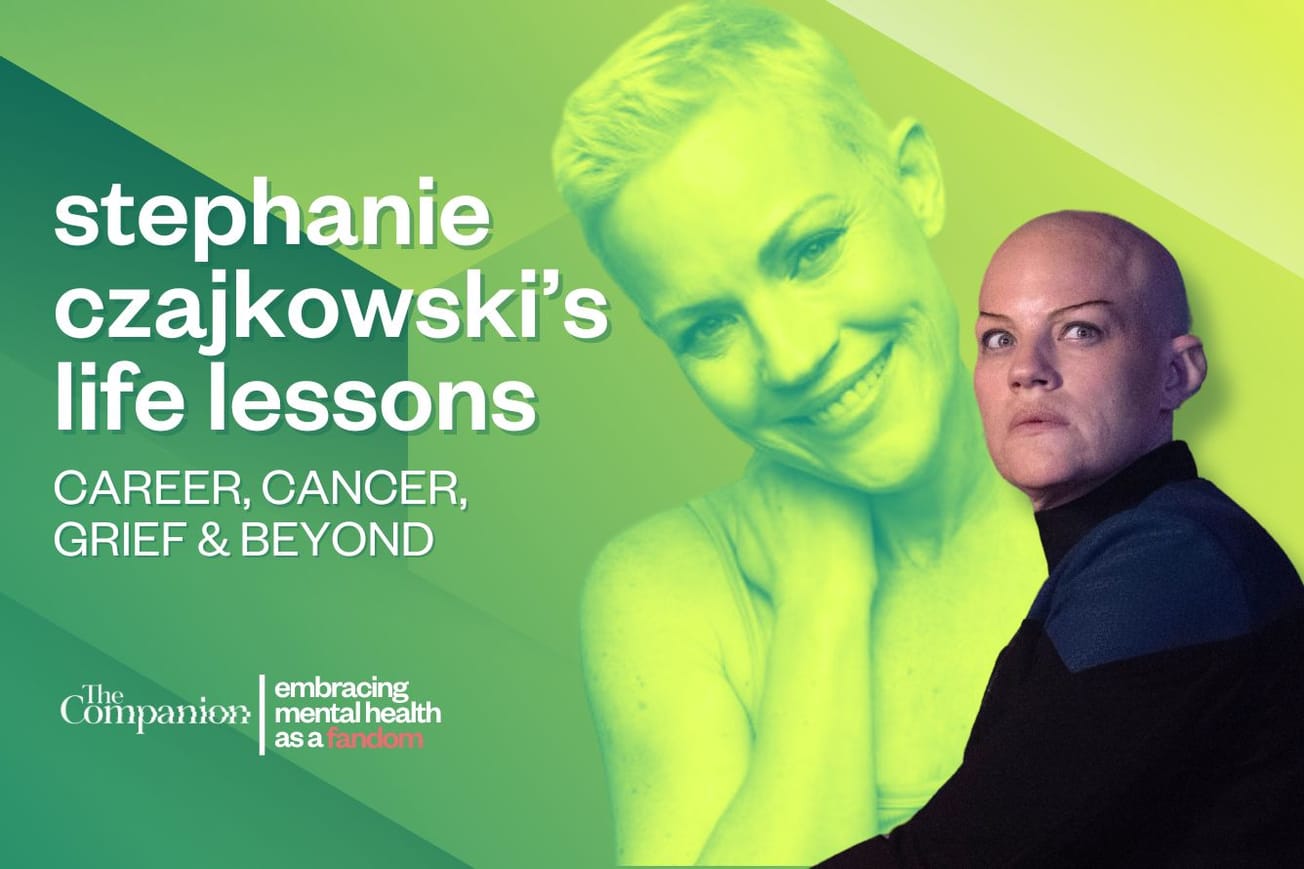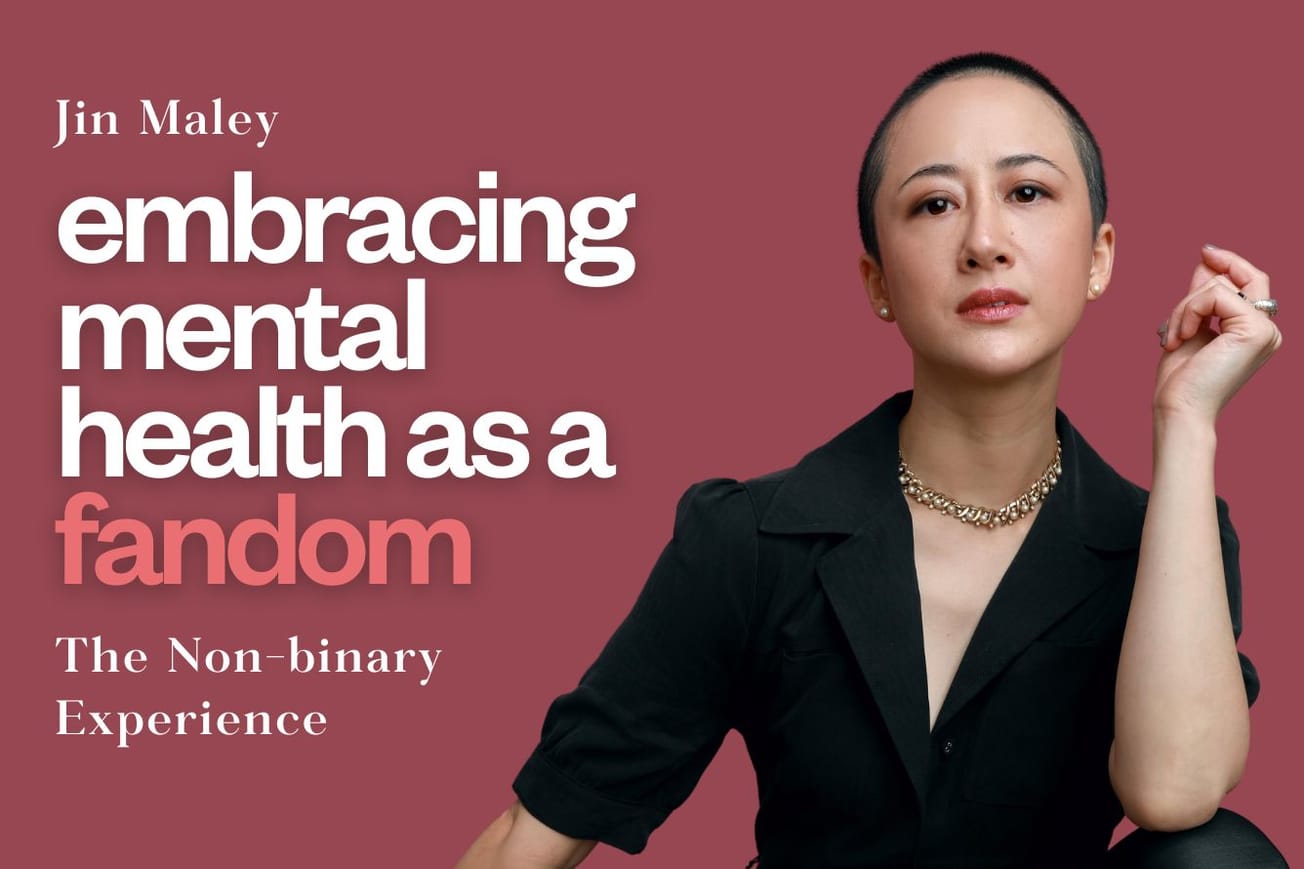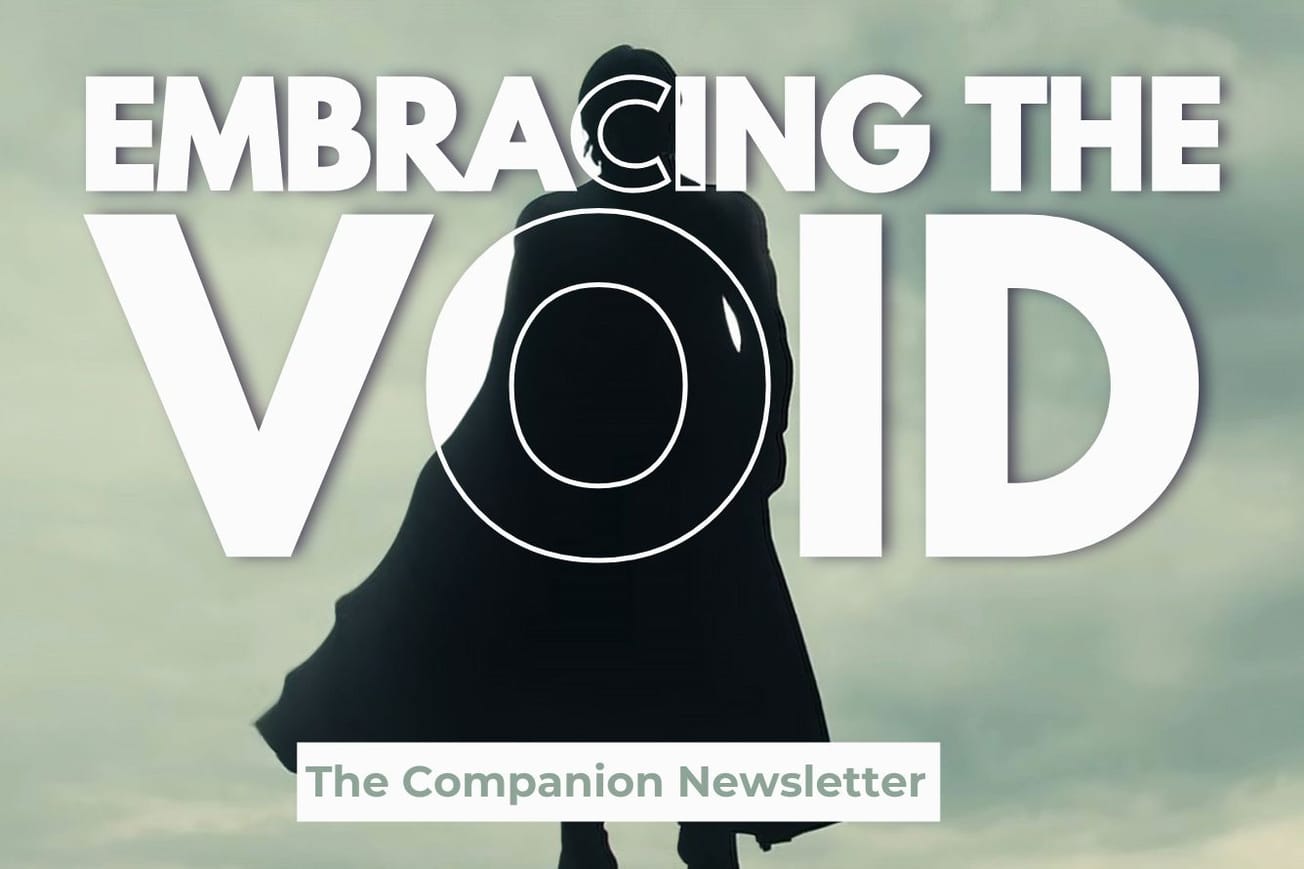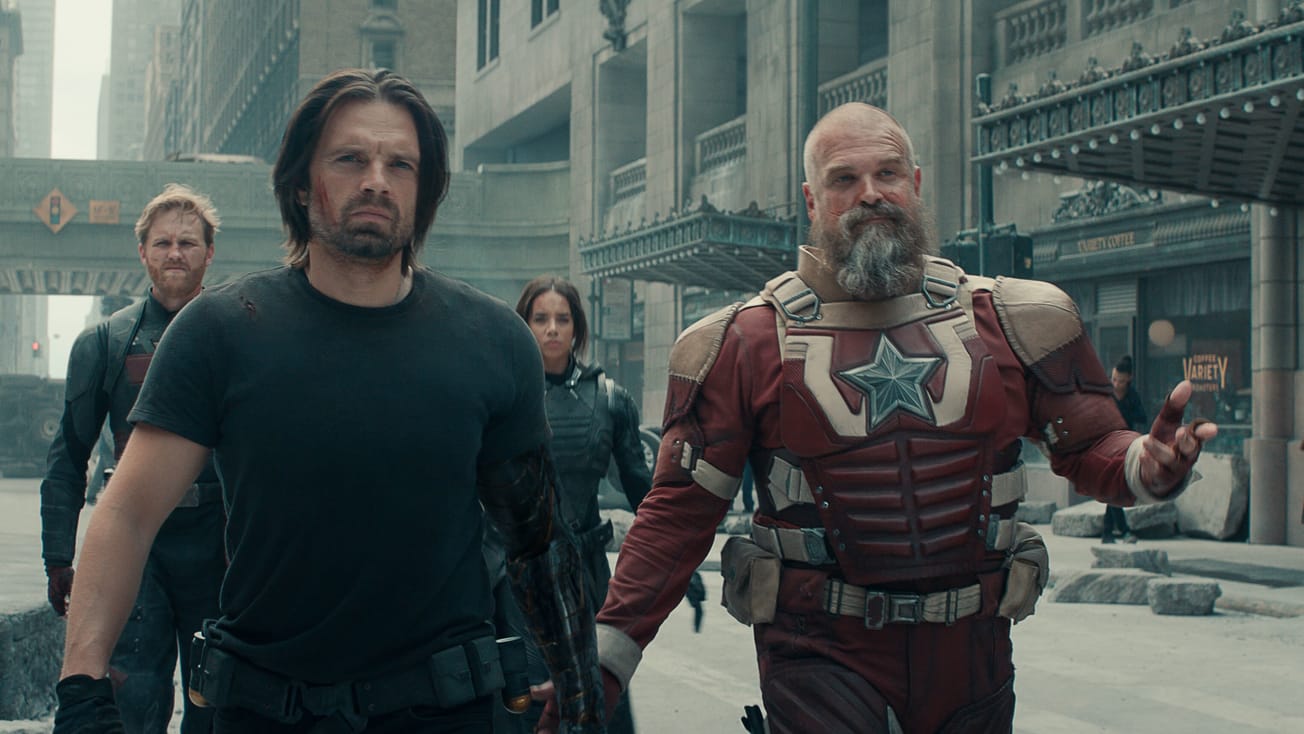Like many Next Generation-era Star Trek fans, I have complicated feelings about Star Trek: Picard. Season 1 was a wild ride, to say the least. There were plenty of things to like about it: Patrick Stewart's performance (and the quality of acting overall), the visual effects and production design, callbacks to past eras of Star Trek, and guest appearances from beloved characters, to name a few.
But there were also things I found hampered my enjoyment: a darker Federation, plot holes, some cringe-worthy dialogue, and some continuity errors. But while there’s plenty to criticize about Picard Season 1, there’s a critique that I just don’t think is fair: that is, the Picard of Star Trek: Picard and the Picard of Star Trek: The Next Generation seem like two entirely different characters.
To that, I say: well, what did you expect?
It’s been decades since the events of Star Trek: Nemesis (2002). Time, age, and reflection change us all, and Jean-Luc Picard is no exception.
To that end, there’s one particular difference between the Picard of Picard and the Picard of TNG that I want to dig into. This difference comes to the foreground in this beautifully written and acted scene from the Star Trek: Picard episode ‘Stardust City Rag’ (S1, Ep5):
Seven: “After they brought you back from your time with the Collective, do you honestly feel that you regained your humanity?”
Picard: “Yes.”
Seven: “All of it?”
Picard: “No. But we’re both working on it, aren’t we?”
Seven: “Every damn day of my life.”
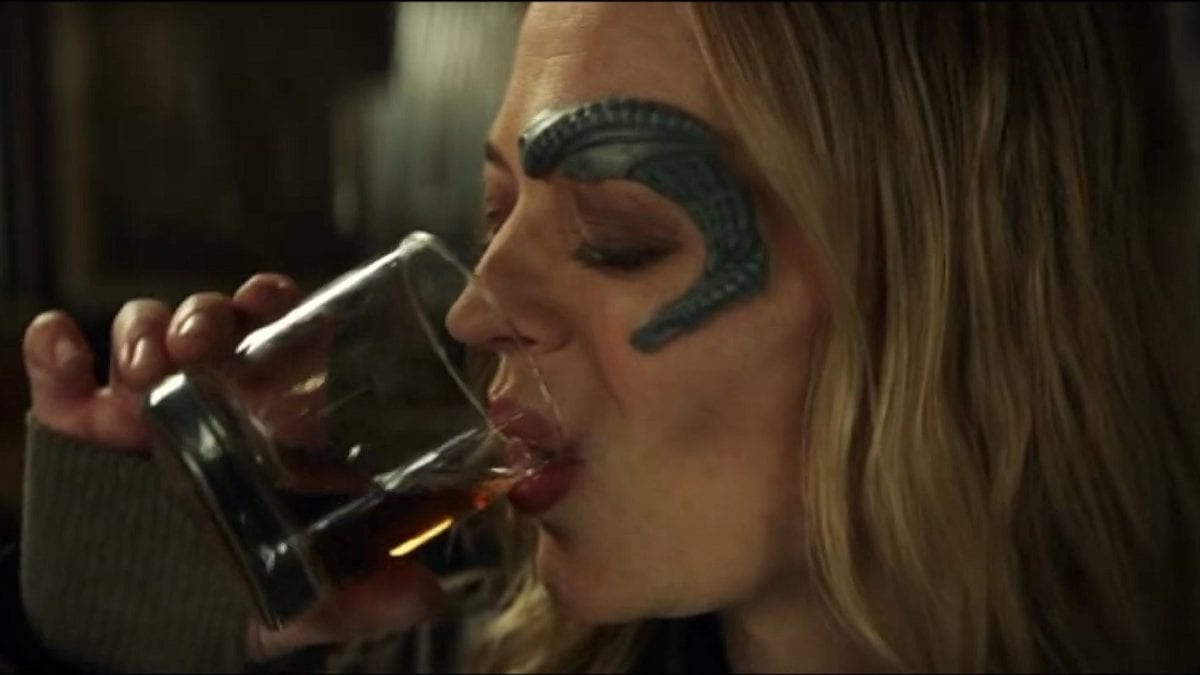
What makes this particular scene so great is that it’s the first time we’ve heard Picard admit so honestly the impact that his experience with the Borg had on his humanity. Now, at first glance, this may seem to contradict previous statements in The Next Generation. For instance, in the Star Trek: The Next Generation episode ‘The Drumhead’ (S4, Ep21), Picard adamantly states that he has “completely recovered” from his assimilation.
Then again, there’s the famous “White Whale” scene in Star Trek: First Contact (1996), where Picard’s visceral hatred for the Borg rears its ugly head:
“I will not sacrifice the Enterprise. We’ve made too many compromises already, too many retreats. They invade our space and we fall back. They assimilate entire worlds and we fall back. Not again. This line must be drawn here. This far, no further! And I will make them pay for what they’ve done!”
After that literally destructive outburst, Picard eventually realizes the error of his ways and decides to give up his quest for revenge. But it’s clear that the impact and trauma of the event are still present, and powerful enough to cause the typically stoic captain to lose his cool.
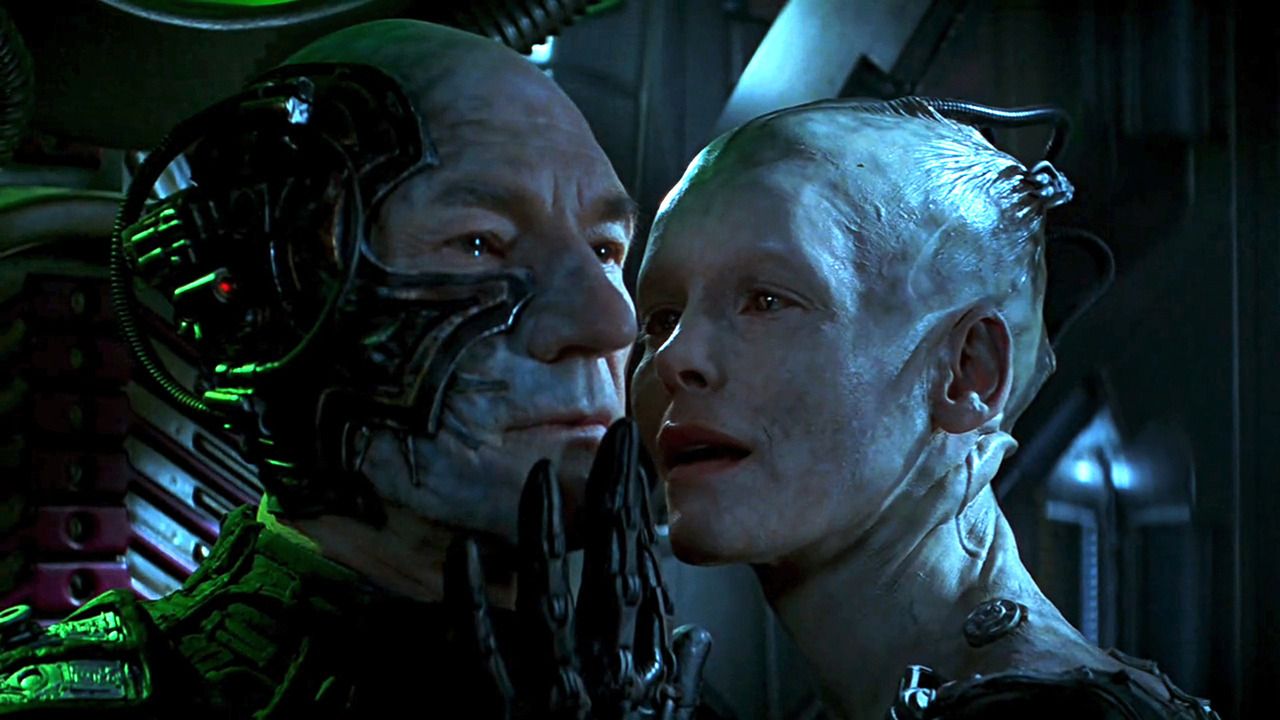
Now, decades later, we get to see how the decades have reshaped Picard’s relationship with his trauma, and the perspective it gives on his own humanity.
Exploring this character's journey alongside that of Seven of Nine (Jeri Ryan) presents an opportunity to compare and contrast and dive deeper into how assimilation—and trauma in general—can impact one’s perception of their own humanity.
To Dream the Impossible Dream...
The quest to discover one’s humanity is a common theme in Star Trek, one that touches every chapter of the franchise. Spock (Leonard Nimoy) has to wrestle with his Vulcan and human sides in an attempt to reconcile the two. Data (Brent Spiner) seeks to overcome his programming and learn how to be fully human. And after being raised by the Borg Collective, Seven of Nine attempts to reclaim her birthright of individuality stolen from her as a child.
At first glance, it may seem that their quests are futile. Spock eventually claims his Vulcan heritage as most prominent, Data dies before he can fully grasp human emotion, and the fact that Seven is asking Picard if he ever fully regained his humanity shows that she hasn’t reached the end of her road either.
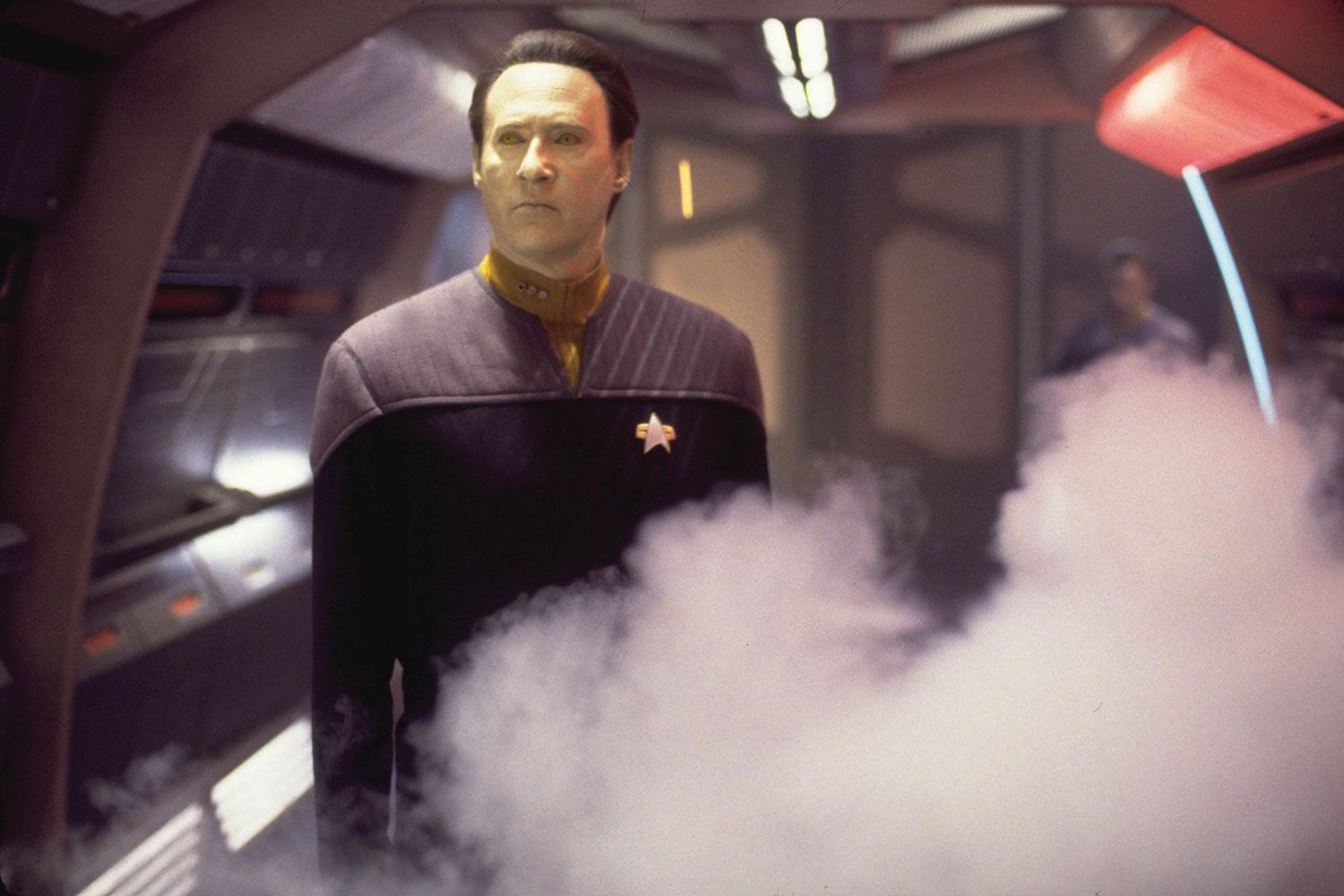
Although Star Trek is known for putting humanity on a pedestal, I wonder if in doing so, it has made the goal of being human too unattainable. Because if there’s anything that’s central to humanity, it’s that the human experience isn’t some dream that you can work toward with a reward at the end. No, it’s the day-to-day experience of struggling to be better and do better, making mistakes, dealing with setbacks, and picking yourself back up to try again.
Picard’s confession brings this point home in a profound way. On the one hand, it can be depressing, especially for a character like Seven who seeks perfection in all she does. But on the other hand, it offers a glimmer of hope. Because if Jean-Luc Picard hasn’t fully recovered his humanity after his trauma, then I think we all can cut ourselves some slack.
To cross franchises for a moment, I’m reminded of the scene in The Fellowship of the Ring (2001) when Frodo (Elijah Wood) receives his wound from the Morgul blade at Weathertop. Much like Borg assimilation, an untreated stab from the blade would cause the victim to fade into a wraith, completely losing their individuality and becoming a slave to the Dark Lord. Although Frodo recovers from this wound, it never fully heals. Every year on the anniversary of that fateful night, he falls into a haze of despair as the trauma rears its ugly head.
After serious trauma, reclaiming your humanity isn’t something that happens overnight. Nor is it a Nirvana-like state that you can one day achieve by working hard enough. It’s not the destination that matters, but the journey.
This is what the humans of Star Trek understand: being human isn’t about reaching some predetermined result, but by working toward that, in Seven’s words, every damn day of our lives.
Age: Not Just a Number
Aging is one of the central themes of Star Trek: Picard, something completely natural given the age of the principal actor. It’s also one of those areas where Star Trek has not really “boldly gone” in the past, at least not to this level of detail.
Despite all the challenges that humanity has solved in the 24th century: war, poverty, disease, and the like, there’s one final frontier that still remains: time. This point is made so beautifully by Jean-Luc in the Star Trek: Picard Season 2 opener ‘The Star Gazer’ (S2, Ep1):
“We refer to space as the ‘final frontier.’ But the older I get, the more I come to believe that the true final frontier is time. In command, as in life, what we do in crisis often weighs upon us less heavily than what we wish we had done. What could have been. Time offers many opportunities, but it rarely offers second chances."
By getting the chance to see Picard in his sunset years (which, admittedly, are much later than the average 21st-century human would experience), we also get the chance to explore some deeply human themes through the eyes of a character who we’ve come to know and love.
Namely, we get to explore this theme of second chances, regrets, and how those regrets influence our outlook on life. We get to see Picard spend time in reflection, gaining new perspectives that were not available to him in his younger years.
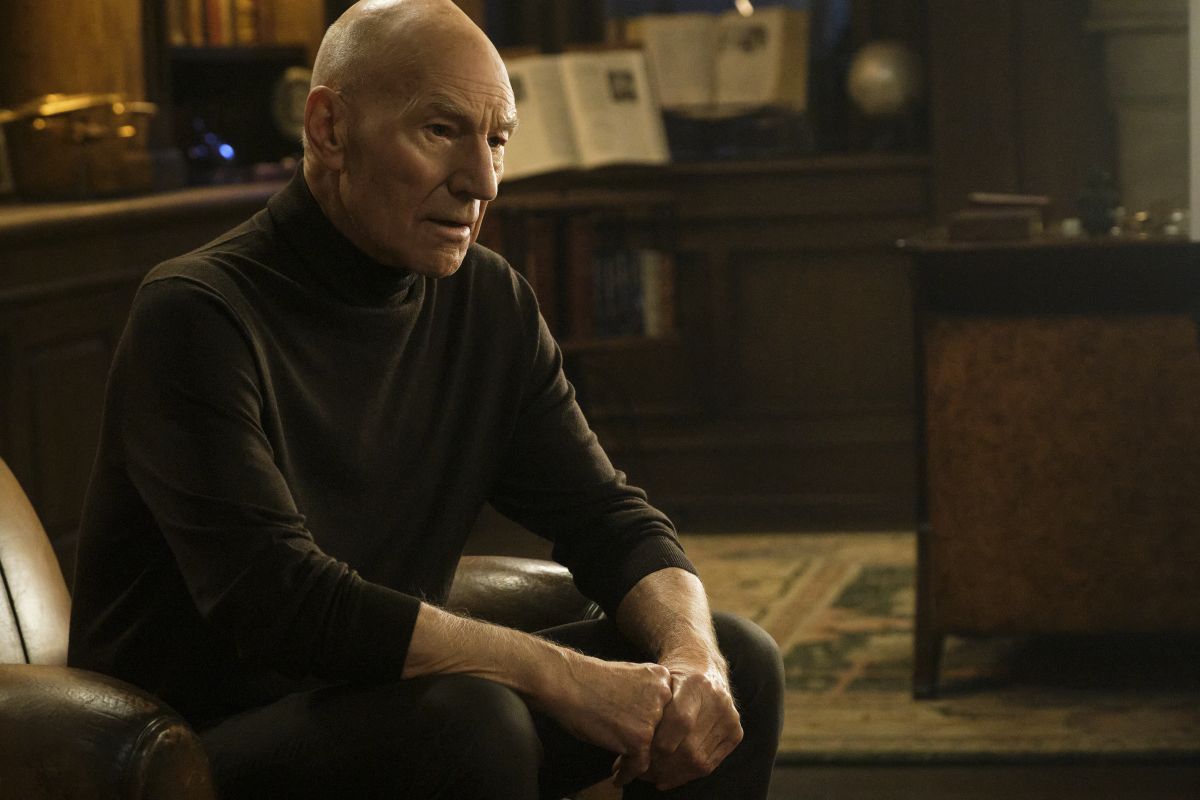
Yes, this means that there are differences between this Picard and the one from Star Trek: The Next Generation. But in my mind, it’s actually what makes the show realistic and interesting. Picard changes over time, and the many scars that he experienced over the course of his life—the death of Data, his encounter with the Borg, etc.—all rear their ugly heads at some point.
One of the most unrealistic things about the TNG era of Trek (Star Trek: Deep Space Nine excluded) was the fact that all of the traumas these characters experience—Picard on Star Trek: The Next Generation and Seven on Star Trek: Voyager—all end up resolved by the end of the episode (or at least after only a few episodes). This, of course, is nothing more than a product of the times. When these shows were on the air, syndication was the name of the game. And that meant self-contained stories that could be broadcast in no particular order.
But these days, television is a completely different ball game. Deep, emotional character arcs that span multiple seasons are completely natural. It’s no surprise that Star Trek: Picard leans into this modern trend. Yet what it does beautifully is weave together the events of the TNG era with the events of the modern era to tell a story that’s more cohesive than people might think.
Here’s what I mean: in Star Trek: The Next Generation, Picard was dealt enormous trauma, but never dealt with those issues, instead just keeping a stiff upper lip and moving on to the next challenge. Seven was much the same. But years and years of allowing this trauma to fester and remain unaddressed birthed these new versions of the characters that we see in Picard—characters who have now reached a tipping point and now must address these issues head-on before they destroy themselves and everyone around them.
With age comes reflection and, hopefully, wisdom. We look back on what we’ve done, and what we haven’t done, and take stock of our life. We put things in perspective and learn more about who we are and how the events of our lives have shaped us.
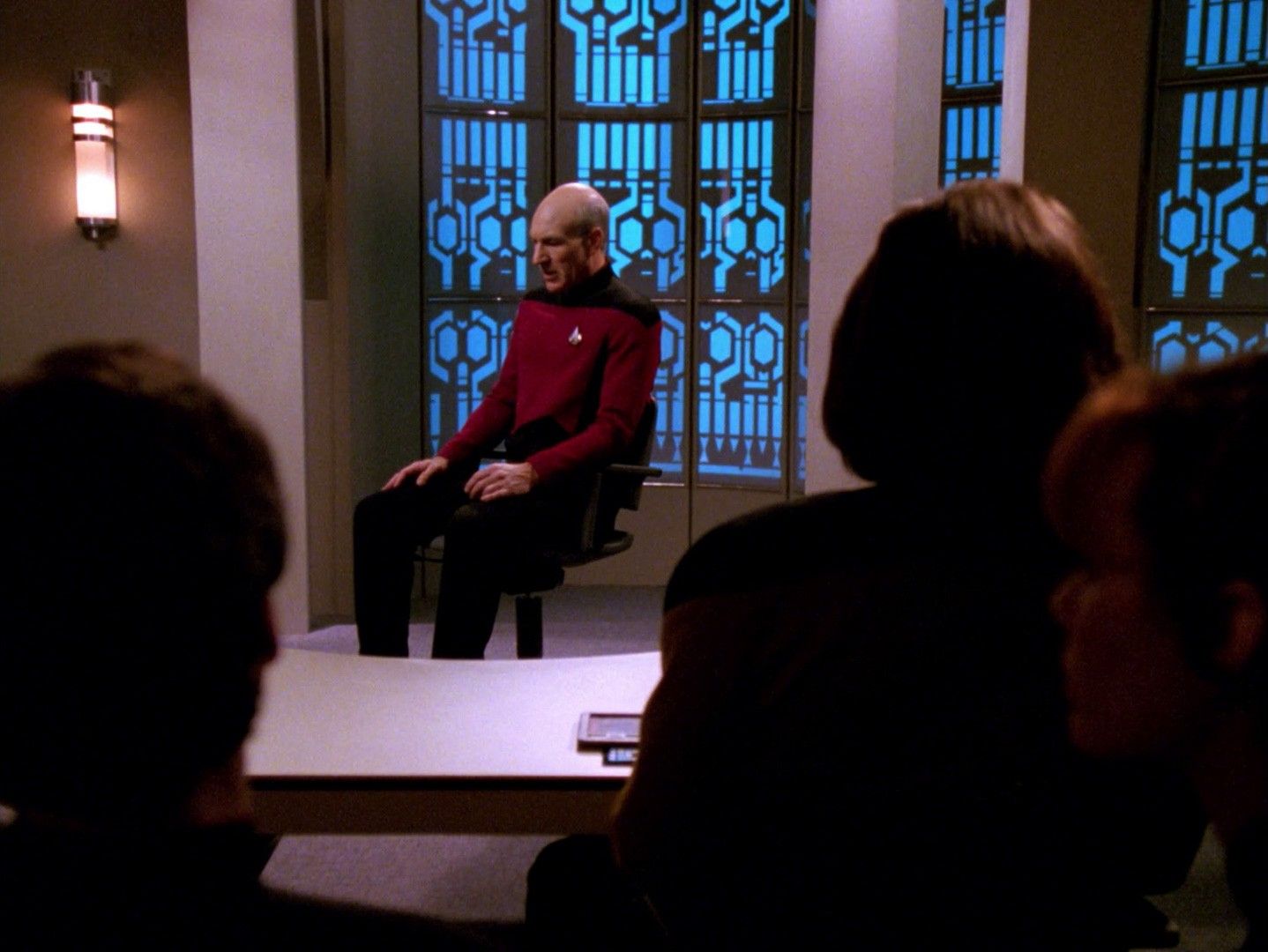
This is one of the reasons that I love the fact that Picard admits that he hasn’t fully regained his humanity. It’s possible that his insistence in the Star Trek: The Next Generation episode ‘The Drumhead’ (S4, Ep21) that he was completely recovered was, in a sense, a folly of youth, an effort to stifle the disquiet inside, or – most likely – determination to prevent his character from coming under question during a bitter internal investigation. In other words, age has changed his relationship with his trauma.
Yet when he talks to Seven about this, he doesn’t come across as defeatist or nihilistic. Quite the opposite: the scene has a hopeful tenor to it (never mind the fact that Seven goes on a murderous rampage directly following). As he has aged, Picard has learned that his trauma has taken something from him—something that he will never fully regain—and yet he chooses to go on and be the best human he can possibly be.
It also adds an additional layer to the overarching storyline. In Season 1, the Federation and Starfleet have become the “inhuman” ones, thanks to their illogical and callous ban on synthetic life throughout the Federation. It’s Picard and his rag-tag band of misfits who demonstrate the best of humanity—right up to the end.
In a sense, this is also what Seven of Nine is doing: her work with the Fenris Rangers enables her to do some good in the galaxy, all while she’s trying to build herself from the ground up. Yet she seems to feel like she hasn’t quite reached the level of “perfection” that her time with the Borg taught her to crave.
A younger Picard may have scoffed at the idea of admitting that he hasn’t fully regained his humanity. But an older Picard is smart enough to face the truth and wise enough to realize that at the end of the day, he can still choose to do the human thing regardless.
Humanity: It's a Learned Skill
Humanity isn’t something you achieve at the end of a long journey. It’s a skill that you have to work at over time. And as any of us in the 21st century know full well, it’s not an easy skill to pick up. In fact, it takes a lifetime to master the art of “being a good human.”
When we first see Seven begin her journey toward individuality in the Star Trek: Voyager episode ‘The Gift’ (S4, Ep2), one of the big tensions is that she desperately wants to return to the Collective. I think that’s partly because it’s all she’s ever known, but also because being human requires some learning and responsibility in order to master.
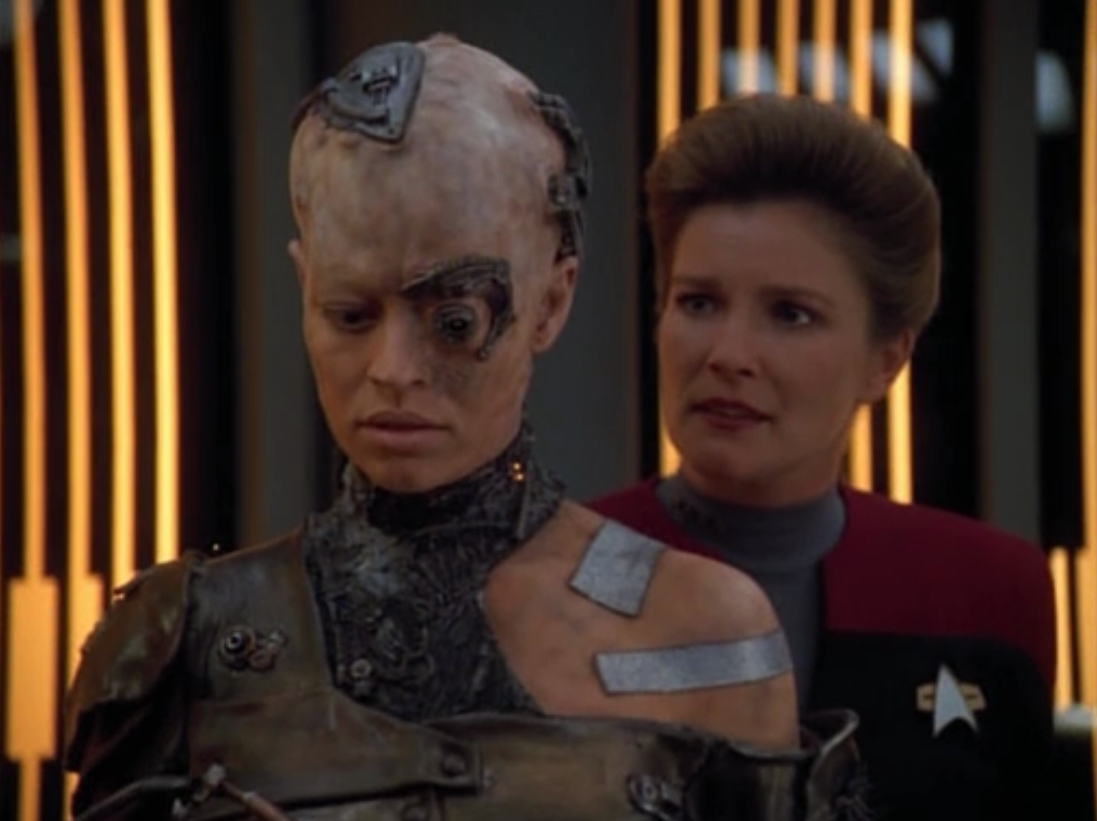
From that moment on, we see Seven pursue this goal with reckless abandon. In fact, if there’s a word that perfectly describes her personality, it would be: intense. She’s abrasive, often cold when interacting with her crewmates. She strives for perfection in every area of life, without stopping to ask whether perfection is a laudable goal. And she strives to continually prove her worth to her new “collective” by constantly outshining and outperforming her peers.
When we meet her decades later in Star Trek: Picard, it’s clear that her core motivations haven’t changed. Her mannerisms are more natural, and she seems to be a bit more personable, but at her core, she hasn’t changed much: aggressively trying to help as many people as possible, hoping that one day she can unlock that mysterious prize called “her humanity.”
This journey comes to a head in the Star Trek: Picard episode ‘Broken Pieces’ (S1, Ep8), when, in an effort to rescue Elnor (Evan Evagora), Seven ends up forming a mini-collective—with herself as the queen. She’s hesitant to do this at first because if she connects to them as a collective, she fears that she won’t be able to let them go.
It’s impossible to watch this scene without thinking about a recovering addict. Having become addicted to the perfection and order in the Collective, Seven has to continually shun that path for fear that she might slip back into it.
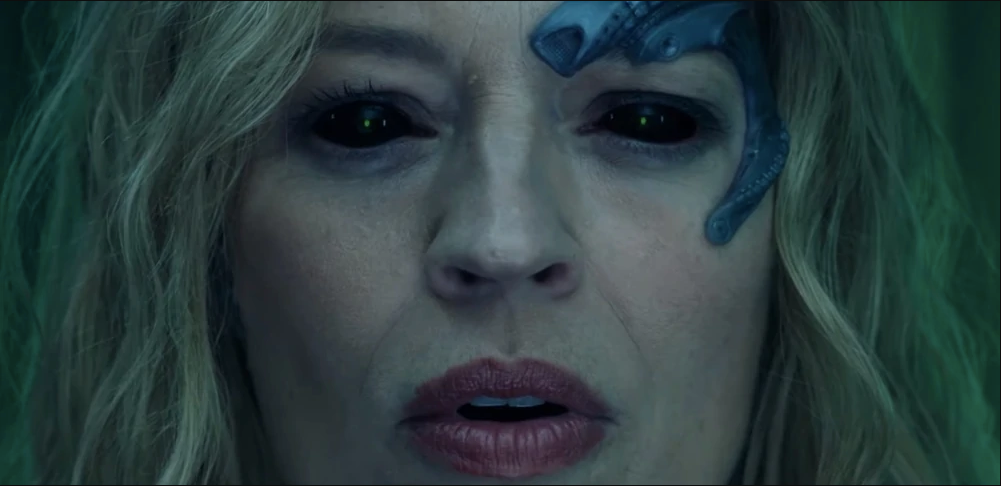
But the most poignant part of this scene is the fact that it illustrates the inevitable danger of Seven’s intense, full-speed-ahead pursuit of humanity. While her work and goals are noble, the fact that she’s pursuing it as some kind of atonement means that she runs the risk of letting it slip through her fingers.
Contrast that with the journey that Picard’s been on during the same time period.
One of the reasons I think that Picard has such a firm grasp on his humanity is that he’s given up the quest for perfection. While I’m sure that Chateau Picard is run with perfect efficiency and that the quality of his vintage is second to none, it is nothing like life aboard a Starfleet vessel.
While the pursuit of achievement is certainly noble and something that we should all aspire toward, there’s also the flip side of the coin: learning to just be.
Perhaps this is my American upbringing bearing its influence, but I feel like learning how to just “be” is a part of humanity that we’re rarely encouraged to cultivate. Even the way we talk about rest is couched in productive terms: “work hard play hard” or “you do your best work when you’re rested” — essentially, rewarding rest only because of its impact on your own productivity.
There’s virtue in work, and there’s virtue in rest. Picard grows restless when staying in his chateau for too long, and Seven moves so fast in pursuit of her humanity that she risks it slipping through her grasp.
What these characters illustrate is that the truth is in a balance between the two.
This article was first published on March 22nd, 2022, on the original Companion website.


